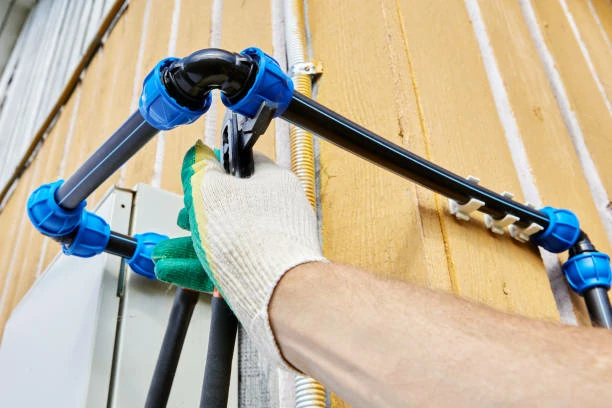Introduction to PE Water Pipes
Polyethylene (PE) water pipes are widely used for their durability and corrosion resistance. These pipes are essential for various applications, from residential plumbing to industrial water supply. Understanding their anti-corrosion properties is crucial for maximizing their benefits.
Basic Structure and Composition
PE water pipes consist of high-density polyethylene (HDPE) material. This composition provides strength and flexibility. The smooth inner surface reduces friction and ensures efficient water flow. The molecular structure of PE contributes to its resistance to chemical reactions and environmental stress.
Corrosion Resistance Properties
PE pipes resist corrosion from various substances. Unlike metal pipes, PE does not rust or corrode when exposed to water and chemicals. This resistance extends the lifespan of the pipes and reduces maintenance needs. The material’s inert nature prevents reactions with acidic and alkaline substances, ensuring consistent performance.
Chemical Resistance
PE water pipes show excellent resistance to a wide range of chemicals. They do not degrade when exposed to aggressive chemicals found in soil and water. This resistance makes PE pipes suitable for transporting various fluids, including potable water, wastewater, and industrial liquids. Their chemical resistance ensures long-term reliability in harsh environments.
Environmental Stress Crack Resistance
PE pipes withstand environmental stress cracking. They maintain integrity under mechanical stress and temperature fluctuations. This resistance prevents the formation of cracks and leaks, ensuring reliable performance over time. The flexibility of PE allows it to absorb shocks and vibrations, further enhancing its durability.
UV Resistance
PE pipes resist damage from ultraviolet (UV) radiation. Special additives in the material protect the pipes from UV-induced degradation. This resistance makes PE pipes suitable for outdoor installations. They maintain their mechanical properties and performance even after prolonged exposure to sunlight.
Applications in Residential Plumbing
In residential plumbing, PE pipes offer reliable water distribution. Their corrosion resistance ensures a clean water supply free from contaminants. PE pipes are used in water supply lines, service connections, and distribution networks. Their flexibility and durability make them ideal for both new installations and retrofits.
Indoor Plumbing
PE pipes provide efficient water supply for indoor plumbing systems. They resist corrosion from household chemicals and maintain water quality. These pipes are easy to install and require minimal maintenance, ensuring long-term performance.
Outdoor Plumbing
For outdoor plumbing, PE pipes offer reliable performance in various weather conditions. Their UV resistance prevents degradation from sunlight. PE pipes are used for irrigation systems, garden water supplies, and outdoor fixtures.
Industrial Applications
PE pipes are essential in industrial applications due to their chemical and corrosion resistance. They transport various industrial fluids, including chemicals, solvents, and wastewater. PE pipes maintain integrity in harsh industrial environments, ensuring safe and reliable fluid transport.
Chemical Industry
In the chemical industry, PE pipes handle aggressive chemicals without degrading. They transport acids, bases, and other corrosive substances safely. The pipes’ chemical resistance ensures long-term reliability and reduces maintenance costs.
Wastewater Treatment
PE pipes are used in wastewater treatment plants for their durability and corrosion resistance. They transport treated and untreated wastewater, ensuring safe disposal. The pipes resist corrosion from chemicals in the wastewater, maintaining performance over time.
Agricultural Applications
PE pipes play a vital role in agriculture. They provide efficient irrigation and water distribution for crops. The pipes’ resistance to soil chemicals and fertilizers ensures reliable performance. PE pipes are used in drip irrigation systems, sprinkler systems, and water supply lines for livestock.
Drip Irrigation
PE pipes deliver water directly to the roots of plants in drip irrigation systems. This method conserves water and improves crop yield. The pipes’ flexibility and durability make them ideal for various terrains and crop types.
Sprinkler Systems
In sprinkler systems, PE pipes distribute water evenly across fields. They resist damage from soil chemicals and UV radiation. The pipes’ corrosion resistance ensures consistent water supply for optimal crop growth.
Environmental Benefits
PE pipes support environmental sustainability. Their long lifespan reduces the need for frequent replacements, minimizing waste. PE is a recyclable material, contributing to reduced environmental impact. The efficient water flow and reduced leakage help conserve water resources.
Maintenance and Longevity
PE pipes require minimal maintenance due to their corrosion resistance. Regular inspections ensure long-term performance. Any potential damage can be easily repaired, extending the pipes’ lifespan. Proper installation and handling further enhance the durability and reliability of PE pipes.
Cost-Effectiveness
PE pipes offer a cost-effective solution for various applications. Their durability and corrosion resistance reduce maintenance and replacement costs. The initial investment in PE pipes translates to long-term savings. Their flexibility and ease of installation also reduce labor costs.
Conclusion
PE water pipes are essential for modern plumbing and industrial applications. Their corrosion resistance ensures reliable performance and longevity. Understanding their properties and benefits helps in optimizing their use in various environments. PE pipes offer a durable, cost-effective, and environmentally friendly solution for water and fluid transport. Their resistance to chemicals, environmental stress, and UV radiation makes them a preferred choice for numerous applications. By utilizing PE pipes, users can enhance the efficiency, reliability, and sustainability of their water distribution systems.
Connecter
IFAN is a Chinese manufacturer of plastic pipes, fittings and valves with 30 years of experience. If you are interested in IFAN Raccords en cuivre, vannes en cuivre, tuyaux et raccords en plastique, veuillez nous contacter. IFAN offers you a variety of standard pipes to meet your specific needs. Click below to learn more about IFAN’s wide range of affordable and cost-effective valve products and piping system related products.
We will reply your email or fax within 24 hours.
You can call us at any time if there is any question on our production.
For more information,pls visit our webside https://ifanpro.com/
Veuillez envoyer un courrier à l'adresse suivante [email protected]
Whatsapp : + 86 19857948982














Commentaires récents